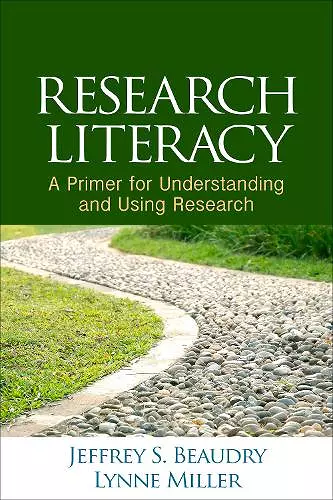Research Literacy
A Primer for Understanding and Using Research
Lynne Miller author Jeffrey S Beaudry author
Format:Hardback
Publisher:Guilford Publications
Published:20th Apr '16
Currently unavailable, and unfortunately no date known when it will be back
This hardback is available in another edition too:
- Paperback£56.99(9781462524624)

Preparing students to become informed, critical consumers of research, this accessible text builds essential skills for understanding research reports, evaluating the implications for evidence-based practice, and communicating findings to different audiences. It demystifies qualitative, quantitative, and mixed methods designs and provides step-by-step procedures for judging the strengths and limitations of any study. Excerpts from real research reports are used as opportunities to develop methodological knowledge and practice analytic skills. Based on sound pedagogic principles, the text is structured for diverse learning styles: visual learners (concept maps, icons), active learners (building-block exercises and templates for writing), and story learners (examples, reading guides, and reflections).
Pedagogical Features
*Rubrics, checklists of steps to take, and reading guides that walk students through analyzing different types of research articles.
*Journal abstracts with questions that home in on key aspects of a study.
*Exemplars of each type of study, with descriptions of methodological and design choices.
*End-of-chapter skills-building exercises that lead up to writing a research review essay.
*Chapter appendices featuring sample responses to the exercises.
"At last, we have a clearly written and extremely accessible book on research--both qualitative and quantitative--for students and others reading (and doing) research! Readers learn all the conventions of research that people usually have to discover on their own, such as how to cite people, use APA style, and even how to list references. The book explains when and how a researcher would use both qualitative and quantitative methods, including ways to use them together. The chapter on ethnography provides one of the best descriptions of this method and its complexities that I have seen."--Ann Lieberman, EdD, Senior Scholar, Stanford Center for Opportunity Policy in Education, Stanford University
"As a teacher educator, I am concerned that my students develop the ability to understand just what the research in their field does and does not say, and the implications for practice. This very useful text will serve that goal. It is appropriate for introductory educational research courses for both preservice and inservice education students. I appreciate that the text is designed for readers with a variety of cognitive styles, and that it uses visual representations and concept maps to explain research processes. It discusses the assumptions and methodologies employed by different research designs and provides a great understanding of the limitations of descriptive research (especially test reports) to drive policy."--Katherine K. Merseth, EdD, Senior Lecturer and Director of Teacher Education, Harvard Graduate School of Education
"The emphasis on research literacy is essential in training forward-thinking educators. Most students at the master's level will not be engaged in deep experimental research, but as future practitioners, they will need to understand the published research and conduct 'in-house' studies. That is where this book can serve its most important function. The discussion of sampling (often the weakest link in a research study) is very good. The final chapter, on doing reviews--a frequently overlooked topic--brings everything together and serves as an excellent synthesis."--Louis Berry, PhD, School of Education (Emeritus), University of Pittsburgh
"This is a good introduction-to-research text, particularly for students not interested in doing research. The material on critiquing research articles is first-rate. You could depend on a student being able to critique a research article after successfully completing a course using this text."--Marilyn Petty Glick, PhD, Instructor, Department of Education, Indiana University Kokomo
"I like the concept maps and the end-of-chapter resources and performance tasks."--Norma K. Clark, PhD, former director, Graduate Programs in Education, Delaware State University
"The authors succinctly and logically summarize the salient features and designs most commonly aligned with qualitative researchers. They provide appropriate examples of scholarly work to illustrate the various designs."--Susan Kushner Benson, PhD, Department of Educational Foundations and Leadership, University of Akron
-
ISBN: 9781462524631
Dimensions: unknown
Weight: 928g
380 pages